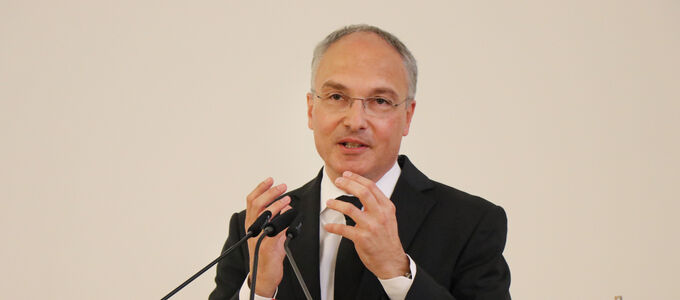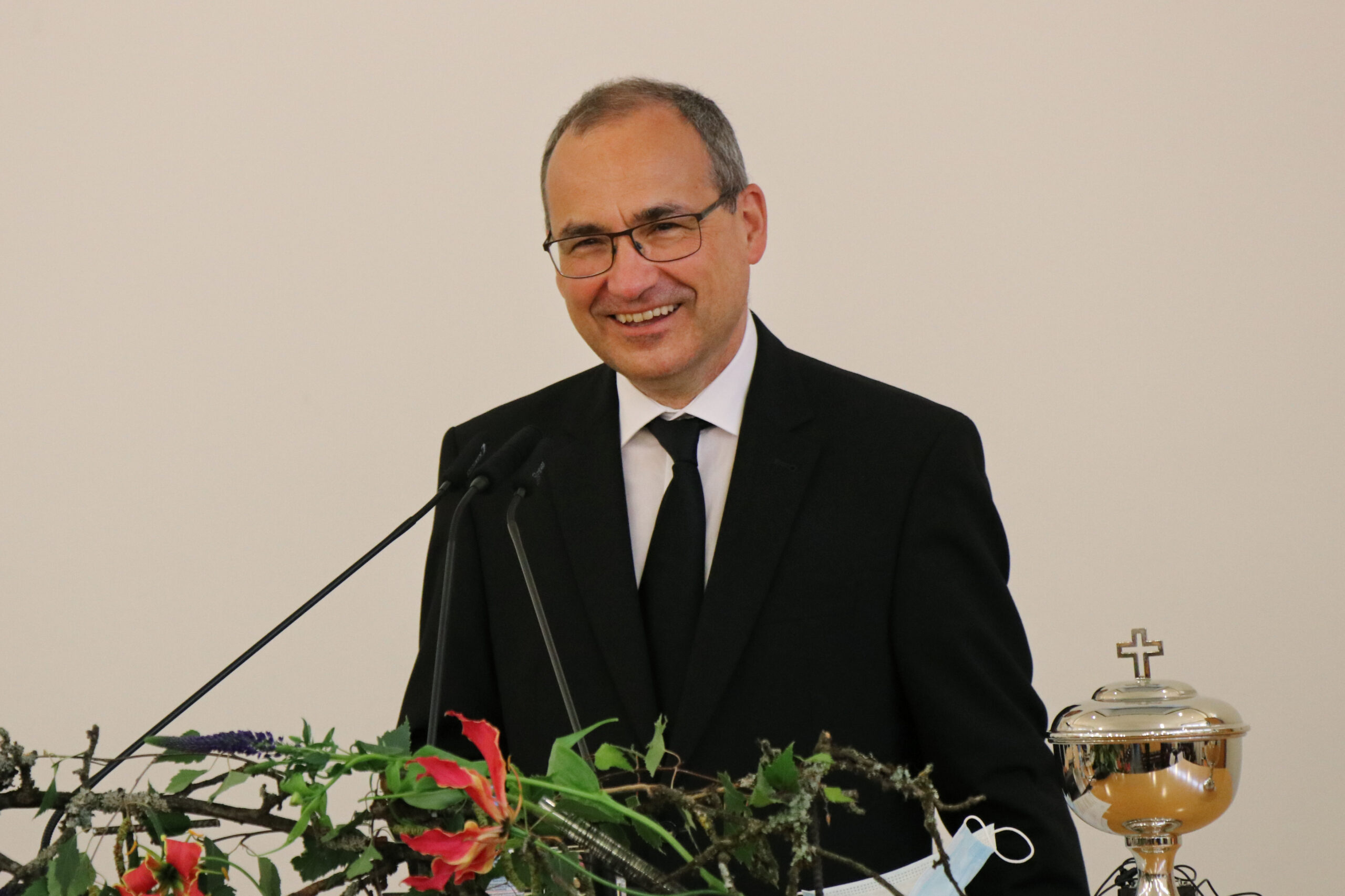
“Let us trust in God, let us believe in Jesus Christ, let us believe in the effectiveness of the Holy Spirit and act accordingly. Those who do this will benefit fully from salvation. This is nothing new, but I don’t know of anything else that would be more important for us than that.”
It was with this emphatic message that Chief Apostle Jean-Luc Schneider ended his divine service on 20 June 2021. He was in Gaggenau in the southern part of Germany and the service had been broadcast to the members in Norway via YouTube. The reason? “I had planned to be in Oslo today. Unfortunately, it is still not possible to enter the country, at least not for a Frenchman. But the District Apostle was very concerned that our brothers and sisters in Norway should not be forgotten.”
The Chief Apostle based his sermon on Psalm 91: 14–15: “Because he has set his love upon Me, therefore I will deliver him; I will set him on high, because he has known My name. He shall call upon Me, and I will answer him; I will be with him in trouble; I will deliver him and honour him.” This sounds like a contradiction at first, the Chief Apostle said. Certainly, there are promises in this verse—I will deliver him; I will set him on high; I will deliver him and honour him—and that sounds good. But each promise is attached to a condition: “Because he has set his love upon Me, I will deliver him; I will set him on high, because he has known My name.”
“Why is that?” the Chief Apostle asked. “God loves all human beings; and He wants to save every single person, after all.” We are always being told that His love is unconditional. Here are the explanations.
God has many names
When the Bible says that we know the name of God it means that we know His nature and His actions. For Moses, God’s name was “I am who I am” or, in another translation, “I will be who I will be”. Moses brought these names to the people of Israel.
Jesus Christ showed people that God is a God of love and grace, who makes the sun shine for the good as well as for the bad. He assured them that God is there for every single person and that He has even numbered the hairs on each person’s head. “His is not a mass production. He knows exactly what every person needs, and He will provide it.” This too, he said, is one of God’s names.
Things continued from there: Jesus Christ was God. Before He was born He was called Immanuel, meaning “God with us”. He had revealed Himself as the God who sacrifices Himself for humankind. And when Jesus returned to His Father, He promised to send a Helper and Comforter, the Holy Spirit. He presented Him as their Advocate, Helper, and Comforter. That is the name of God: He, who is always there for all people, who loves every single one, who has given His life for them, who cares and provides for them.
He deserves our trust
Now comes the mystery: “Only those believers who trust God completely can truly enjoy His love. Jesus Christ died for all! He loves all human beings! But only those who believe in Him and trust in Him can receive salvation. Yes, the Holy Spirit wants to help all people, but only those who believe in Him can experience His comfort and strength!” God certainly loves all human beings, the Chief Apostle said, and provides for them whether they believe in Him or not. “However, those who do not believe in God always worry a lot about how they will get what they need. And many become anxious, others greedy.” Those who believe in Jesus Christ and in His teaching are free from anxiety. “Naturally they worry about their earthly lives, but they know: God will provide what I need. They have peace in their hearts, they trust in God, and God keeps them and protects them.” What a difference: “The Creator is there for all human beings, but what we feel and experience in our hearts depends on faith. Those who do not believe are anxious. Those who believe in God have peace.”
He hears our prayers
The Chief Apostle emphasised that God will hear those who call Him by name. Those who have assimilated Christ’s teaching know how to call upon God. “Sure, God hears the prayers of all people. He wants to help everyone, including those who are not Christians. I am absolutely convinced that He hears the prayers of all human beings. But Jesus Christ said: ‘And whatever you ask in My name that God will give you.’”
So it is not a question of believing that Jesus Christ is the Son of God, but of drawing the appropriate conclusions. “If He is God, then He is my Lord and Master. He defines my life, He defines my thoughts, He shapes my nature. He is my Lord. He tells me what to do and how I should be.” Anyone who thinks like this will receive salvation.
Those who believe in God the Holy Spirit know that they need word and sacrament. At church they receive comfort and salvation; and by receiving the word and Holy Communion, the sacraments, they can experience the full effectiveness of the Holy Spirit.
In the end there is love
“Those who love God will be delivered from sin. I would like to explain this a bit.” And the Chief Apostle took the time to do so. “We know that to receive forgiveness of sins one must believe in God, in Jesus Christ. One must feel remorse and repent.” And this has to be true repentance. This does not come from a fear of punishment, nor from shame. “True repentance is a fruit of love. Because we love God and are truly attached to God, we regret our sins; we know that every fault prevents perfect fellowship with God.”
Genuine repentance is not even dependent on the situation. “It does not depend on how much I have sinned. I am just not good enough to enter into the glory of God; I need grace! It does not matter how little or how much I have sinned, I absolutely need grace,” the Chief Apostle said. God always responds to such repentance with grace and forgiveness.
And finally: “I can’t say, ‘I love the Lord’, if I do not love my brother or sister. If I love God, if I love my neighbour, I forgive them.” And those who do that will find grace for themselves. “We have often heard it: love is the standard of perfection. How great is your love for God, how great is your love for your fellow human beings?”
















